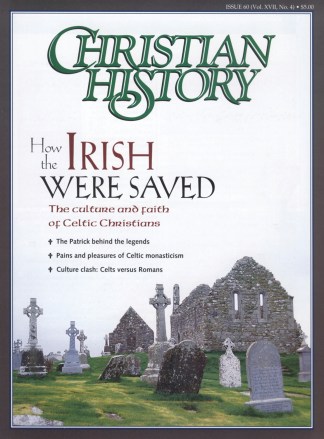I should like a great lake of ale for the King of Kings; I should like the angels of Heaven to be drinking it through time eternal.” So begins Brigit’s prayer as recorded in an eighth-century manuscript. The prayer goes on to describe the party as one in which “barrels of peace” and “vessels of charity” lead to good cheer. Clearly, this Brigit was no ascetic. On the contrary, Brigit’s style as abbess of Kildare was that of the perfect hostess, always welcoming the great and the lowly with equal warmth, serving generously and meeting every need.
This is but one of the many aspects of Brigit’s life that scholars debate—some even argue she is a complete fabrication, a Christianized version of the pagan Celtic goddess of the same name. The historical Brigit is now impossible to recover in the forest of legend and fact that has come down to us. Still, this Brigit is the one who has been revered by generations of Irish Christians.
In many respects she is the female counterpart of Patrick and is beloved among the Irish as “dove among birds, vine among trees, sun among stars.” She lived to serve Jesus by feeding the poor and vanquishing misery wherever she found it. Her fondness for beer is only an extension of her merry approach to life. Legend even tells us that she once supplied a man with an aphrodisiac so that his wife would find him irresistible.
Her inauspicious beginning—born out of wedlock in 454 and raised by a druid—only serves to reinforce the homeliness and sympathy Brigit is best known for. She embraced society’s outcasts as her own family, and freely dispensed the grace that flowed through her.
Her generosity even extended to things that didn’t belong to her. It is said her relationship with her father, rocky at times, reached a flashpoint over this. When he once left her alone in his chariot, Brigit gave away her father’s sword. When he returned, his anger burned so hotly, he dragged her before the king. The king, too, was outraged and demanded an explanation.
Undaunted, Brigit declared that, were the king’s riches and properties hers, she would give them all away to “the Lord of the Elements.” Later, even her community would protest because of her generosity, Brigit kept giving away all they had to live on.
And there were other legendary complaints. Brigit (whose name means “bride”) defeated the arranged marriage by pulling out an eyeball, apparently restored later; she snoozed through Patrick’s sermon (though many accounts say their lives did not overlap); she cursed those who got in her way (a bad habit left over from her druid background); she embarrassed her companions by washing their guests’ feet.
Nevertheless, everyone felt in her the burning presence of God loving all those within her reach, cherishing the lowly, making peace between enemies. This included having authority over men. As the story goes, her local bishop was reading over her the words of consecration as she took the veil. Suddenly he was overcome by God’s presence and read instead from the service for ordination of a bishop, giving Brigit apostolic authority.
She is said to have directed one of the few known double monasteries in Ireland, overseeing both men and women. And Brendan the Navigator also recognized her divinely appointed role. When, in his travels, he met a sea monster who honored Brigit, he sought her out and asked her to hear his confession.
Druid conversion
The stories of Brigit help us see the process of conversion in Ireland. Sharing the same name as a Celtic goddess, Brigit stands on the threshold between pagan religion and Christian spirituality. The goddess Brigit was a deity of fire; before the Christian saint’s birth, a “fiery pillar” was seen near Brigit’s mother. She is reputed to have hung her wet coat from a sunbeam. She could tame wild boars, and her blood could heal the sick.
Tangled as all these myths are, the symbolic transition from druidism to Christianity is made clear in the accounts of her childhood. Abandoned by her father, Brigit and her mother were taken into the home of a druid, who raised the young girl as his own. The druid awakened one day to find angels baptizing Brigit, and when she was grown, the druid returned her to her father and relinquished his claims.
Later her druid foster-father sought baptism himself and joined Brigit’s company, establishing new ties of Christian community.
Brigit was an example of the Celtic respect for women’s spiritual gifts and legal rights. As Roman traditions replaced Celtic ways and the authority of a woman became an institutional embarrassment, later hagiographers downplayed Brigit’s influence.
Nevertheless, after Brigit died in 524, she remained in her people’s memory as a spiritual leader of great humility and power, a woman of joy and deep compassion, a friend to those with broken hearts and broken bodies.
Kathy Mulhern is editor of The Art of Tradition (Living the Good News, 1998) and Our Family Book of Days (Living the Good News, 1997)
Copyright © 1998 by the author or Christianity Today/Christian History magazine. Click here for reprint information on Christian History.










